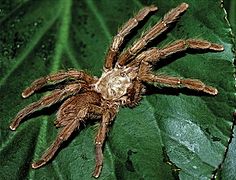Caribena
| Caribena | |
|---|---|

| |
| Subadult female Caribena versicolor in captivity | |
| Scientific classification | |
| Kingdom: | Animalia |
| Phylum: | Arthropoda |
| Subphylum: | Chelicerata |
| Class: | Arachnida |
| Order: | Araneae |
| Infraorder: | Mygalomorphae |
| Family: | Theraphosidae |
| Genus: | Caribena & Bertani, 2017[1] |
| Diversity | |
| 2 species | |
Caribena is a genus of spiders in the family Theraphosidae (tarantulas), found in the Antilles. The two species accepted as of March 2017 were formerly placed in Avicularia.[1] Apart from a different distribution – Avicularia species are found in mainland South and Central America – Caribena is distinguished by having longer and thinner type II urticating hairs in a conspicuous patch on the upper surface of the abdomen. Males also have a differently shaped palpal bulb.[2]
Taxonomy[]
The genus was erected in 2017 by and Rogério Bertani for two species formerly placed in Avicularia.[1] The genus name is derived from the Spanish word caribeña, meaning "from the Caribbean". Species of Caribena are distinguished from those of related genera by the possession of long (more than 1 mm) and very thin (less than 9 µm) type II urticating hairs carried on a conspicuous patch on the upper rear surface of the abdomen. Males have a pointed outgrowth (process) on the retrolateral lobe of the cymbium of the palpal bulb.[2]
Species[]
As of March 2017, the World Spider Catalog accepted the following species, both transferred from the genus Avicularia:[1]
- Caribena laeta (C.L. Koch, 1842) – Puerto Rico, Cuba, US Virgin Islands
- Caribena versicolor (Walckenaer, 1837) – Martinique

Female Caribena laeta; arrow marks urticating hairs

Male Caribena laeta

Immature Caribena laeta
References[]
- ^ Jump up to: a b c d e "Gen. Caribena Fukushima & Bertani, 2017", World Spider Catalog, Natural History Museum Bern, retrieved 2017-03-10
- ^ Jump up to: a b Fukushima, C.S. & Bertani, R. (2017), "Taxonomic revision and cladistic analysis of Avicularia Lamarck, 1818 (Araneae, Theraphosidae, Aviculariinae) with description of three new aviculariine genera", ZooKeys (659): 1–185, Suppl. 1–5, doi:10.3897/zookeys.659.10717, PMC 5345366, PMID 28331414
- Theraphosidae
- Mygalomorphae genera
- Spiders of the Caribbean
- Theraphosidae stubs


